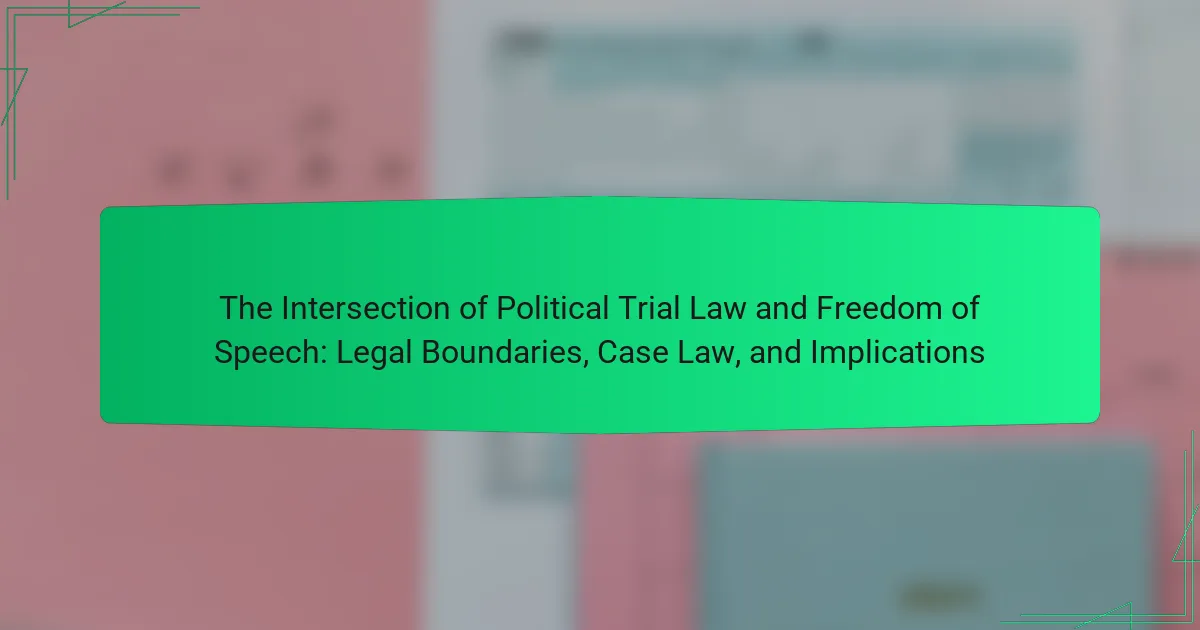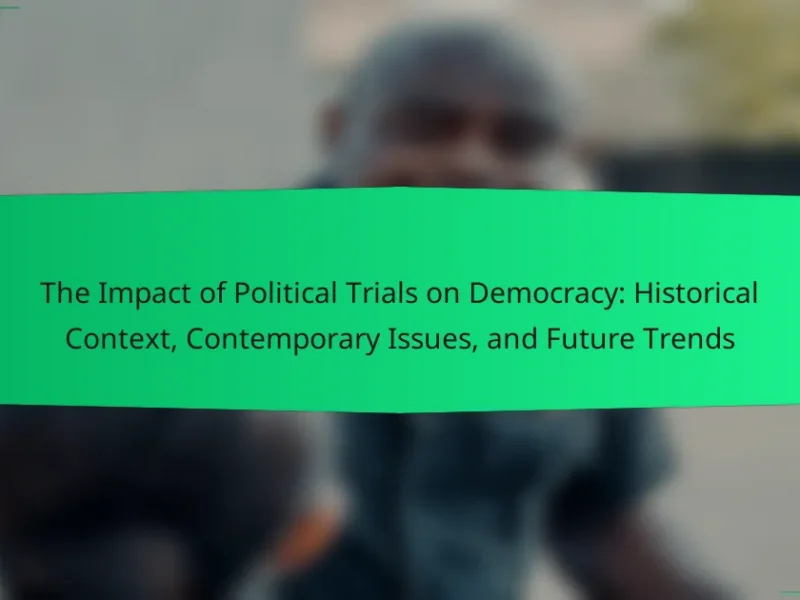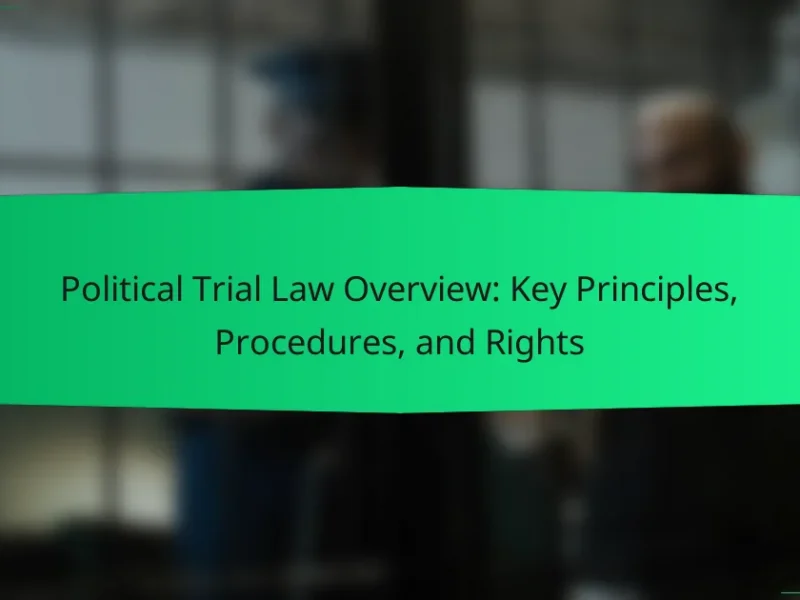The article examines the intersection of political trial law and freedom of speech, focusing on the legal boundaries that govern cases involving political figures and issues. It highlights landmark cases such as Brandenburg v. Ohio, New York Times Co. v. Sullivan, and Tinker v. Des Moines Independent Community School District, which shape the legal landscape surrounding political discourse and individual expression. The discussion emphasizes the implications of political trial law on societal dynamics, including the potential chilling effect on free speech and the historical context of political trials used to suppress dissent. Overall, the article provides a comprehensive overview of how these legal frameworks influence public trust, activism, and the broader discourse on human rights and democratic freedoms.
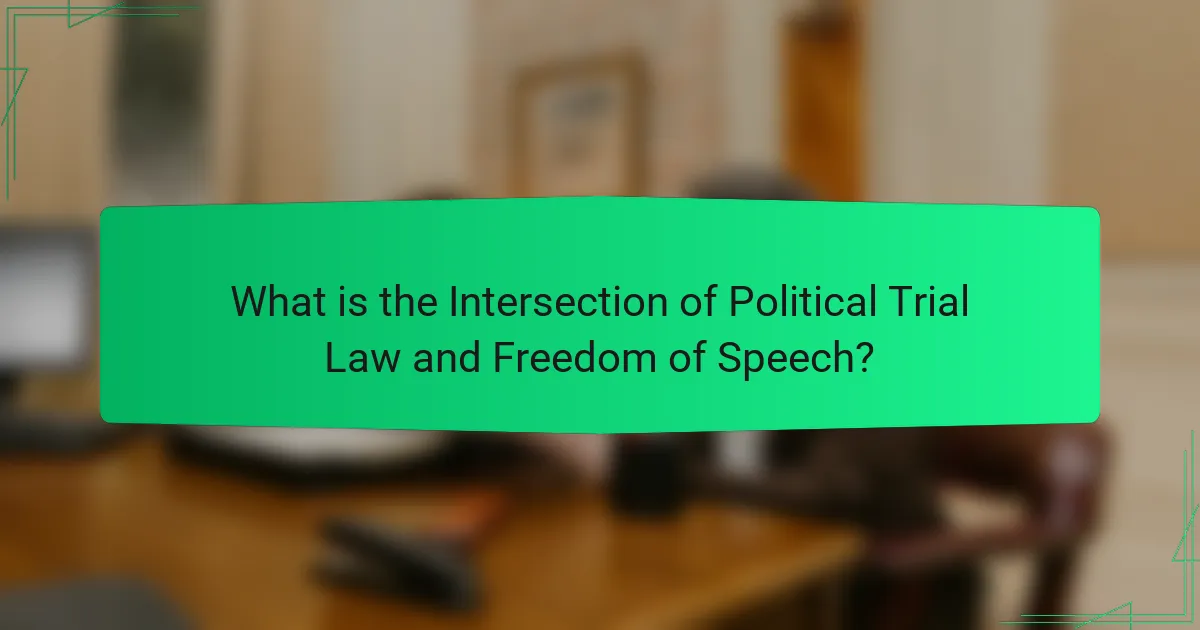
What is the Intersection of Political Trial Law and Freedom of Speech?
The intersection of political trial law and freedom of speech involves balancing legal proceedings against the rights to express opinions. Political trial law governs cases involving political figures and issues. Freedom of speech protects individuals’ rights to express ideas without government interference. In political trials, speech can be scrutinized, especially if it incites violence or disrupts public order. Landmark cases, such as Brandenburg v. Ohio, established that speech is protected unless it incites imminent lawless action. This legal framework ensures that while political discourse is encouraged, it remains within lawful boundaries. The relationship is complex, as political trials often test the limits of free expression in contentious environments.
How do Political Trial Laws influence Freedom of Speech?
Political trial laws significantly influence freedom of speech by establishing legal boundaries for political expression. These laws can restrict speech deemed harmful to national security or public order. For instance, laws governing sedition or incitement may criminalize certain political speech. In many jurisdictions, political trials can lead to censorship or self-censorship among individuals and media. Historical examples include cases where dissenting voices faced prosecution, thereby chilling free expression. The balance between maintaining order and protecting speech rights is often contentious. In democratic societies, political trial laws aim to protect free speech while addressing potential threats. However, misuse of these laws can lead to authoritarian practices that undermine civil liberties.
What are the key principles of Political Trial Law?
Political Trial Law is governed by several key principles. These principles include the protection of political speech, the right to fair trial, and the presumption of innocence. Political speech is often afforded heightened protection under the law. This is due to its fundamental role in democracy and public discourse. The right to a fair trial ensures that defendants receive impartial hearings. This principle is crucial in maintaining justice and public confidence in the legal system. The presumption of innocence protects individuals until proven guilty. This principle is a cornerstone of criminal justice systems worldwide. These principles collectively safeguard the integrity of political trials and uphold democratic values.
How does Freedom of Speech serve as a foundation for political discourse?
Freedom of Speech is essential for political discourse as it allows individuals to express their opinions openly. This expression fosters a marketplace of ideas where diverse viewpoints can be shared and debated. Political discourse thrives on the ability to critique government actions and policies freely. Historical documents, such as the First Amendment of the U.S. Constitution, protect this right. Legal cases, including New York Times Co. v. Sullivan, affirm the importance of free speech in political contexts. These protections encourage civic engagement and informed decision-making among citizens. Without Freedom of Speech, political dialogue would be stifled, limiting democratic participation.
Why is understanding the legal boundaries important?
Understanding the legal boundaries is crucial for ensuring compliance with the law. Knowledge of these boundaries helps individuals avoid legal repercussions. It also promotes responsible exercise of rights, particularly in areas like freedom of speech. Legal boundaries define what is permissible and what can lead to penalties. For instance, case law often illustrates the consequences of overstepping these boundaries. Historical cases, such as Brandenburg v. Ohio, highlight the limits of free speech. In this case, the Supreme Court established that speech advocating illegal conduct is not protected. Thus, understanding legal boundaries protects individuals and supports the rule of law.
What are the potential conflicts between Political Trial Law and Freedom of Speech?
Potential conflicts between Political Trial Law and Freedom of Speech arise when legal proceedings limit public discourse. Political Trial Law often involves cases where speech is scrutinized for its implications on national security or public order. In such instances, individuals may face prosecution for expressing dissenting views. This creates a chilling effect on free speech, as citizens may self-censor to avoid legal repercussions. Historical examples include cases where activists were charged under sedition laws for criticizing government actions. Such conflicts highlight the tension between maintaining order and protecting individual rights. Balancing these interests remains a critical challenge in democratic societies.
How can legal boundaries shape public opinion and political engagement?
Legal boundaries can significantly shape public opinion and political engagement by defining the limits of acceptable discourse. These boundaries establish what can be legally expressed in public forums. For instance, laws against hate speech can discourage negative public sentiment towards specific groups. Conversely, protections for free speech can encourage more open political discussions.
Legal rulings, such as the Supreme Court’s decision in Citizens United v. FEC, have influenced political engagement by allowing greater financial contributions to campaigns. This case demonstrated how legal interpretations can shift the dynamics of political participation. Furthermore, laws regulating campaign financing shape the landscape of political engagement by affecting who can participate and how.
Research shows that communities with stricter legal boundaries regarding speech often exhibit lower levels of political activism. In contrast, areas with more lenient laws tend to foster higher engagement rates. These examples illustrate the profound impact of legal frameworks on public opinion and political activity.
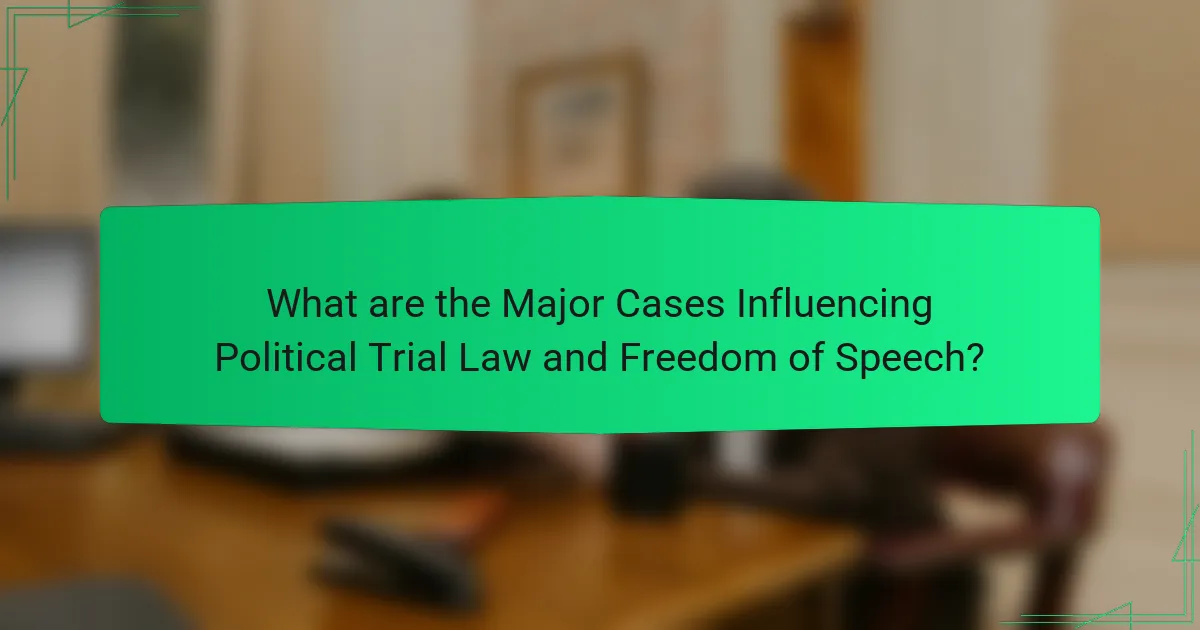
What are the Major Cases Influencing Political Trial Law and Freedom of Speech?
Major cases influencing political trial law and freedom of speech include Brandenburg v. Ohio, New York Times Co. v. Sullivan, and Tinker v. Des Moines Independent Community School District. Brandenburg v. Ohio established that speech advocating illegal action is protected unless it incites imminent lawless action. New York Times Co. v. Sullivan set a high standard for public figures to prove defamation, reinforcing freedom of the press. Tinker v. Des Moines affirmed students’ rights to free speech in schools, as long as it does not disrupt educational activities. These cases collectively shape the legal landscape of political trial law and protect individual expression.
What landmark cases have defined the legal landscape?
Landmark cases that have defined the legal landscape include Marbury v. Madison, Brown v. Board of Education, and Roe v. Wade. Marbury v. Madison established the principle of judicial review in 1803. This case allowed courts to invalidate laws that conflict with the Constitution. Brown v. Board of Education, decided in 1954, declared racial segregation in public schools unconstitutional. This ruling was pivotal in the Civil Rights Movement. Roe v. Wade, decided in 1973, recognized a woman’s legal right to have an abortion. This case significantly impacted reproductive rights and privacy laws. Each of these cases has had lasting effects on American law and society.
How did the Supreme Court rulings impact Freedom of Speech?
Supreme Court rulings have significantly shaped Freedom of Speech in the United States. Landmark cases, such as Schenck v. United States (1919), established the “clear and present danger” test. This test determined that speech could be limited if it posed a significant threat to national security. In contrast, cases like New York Times Co. v. Sullivan (1964) expanded protections for free speech, especially in the context of political discourse. This ruling set a high bar for public figures to prove defamation, reinforcing the principle that robust debate on public issues is essential. Additionally, the ruling in Tinker v. Des Moines Independent Community School District (1969) affirmed students’ rights to free speech in schools, as long as it does not disrupt educational activities. These rulings collectively illustrate the evolving interpretation of Freedom of Speech, balancing individual rights with societal interests.
What are the implications of these cases on Political Trial Law?
The implications of these cases on Political Trial Law are significant. They establish precedents that influence the balance between political expression and legal accountability. Courts often assess the intent and context of political speech in these trials. This scrutiny can lead to varying interpretations of freedom of speech protections. Additionally, these cases may result in stricter legal standards for political figures. They highlight the potential consequences of political actions on legal proceedings. The rulings can also affect public perception of political accountability. Overall, these implications shape future legal frameworks surrounding political speech and trials.
What role do lower courts play in shaping these laws?
Lower courts play a crucial role in shaping laws related to political trial law and freedom of speech. They interpret and apply statutes in specific cases, influencing legal precedents. Their rulings can set important standards for how laws are understood and enforced. For instance, lower court decisions can clarify the boundaries of protected speech under the First Amendment. These courts often handle cases that address the nuances of political expression. Their interpretations can either broaden or restrict the scope of free speech protections. As they adjudicate cases, lower courts contribute to the evolving landscape of legal standards. This process ultimately shapes how higher courts view and rule on similar issues in the future.
How do appellate court decisions affect the interpretation of Freedom of Speech?
Appellate court decisions shape the interpretation of Freedom of Speech by establishing legal precedents. These rulings clarify the scope and limitations of speech rights under the First Amendment. For example, cases like Brandenburg v. Ohio set the standard for protected speech versus incitement. When appellate courts affirm or overturn lower court rulings, they influence how laws are applied in future cases. This creates a dynamic legal landscape where interpretations can evolve. Additionally, appellate decisions often address new forms of communication, adapting legal standards to contemporary issues. Thus, these courts play a crucial role in defining the boundaries of free expression within society.
What specific cases illustrate the interaction between trial law and free speech?
The case of New York Times Co. v. Sullivan (1964) illustrates the interaction between trial law and free speech. This landmark decision established the “actual malice” standard for defamation cases involving public figures. The Supreme Court ruled that free speech protections under the First Amendment limit the ability of public officials to sue for libel unless they can prove actual malice.
Another significant case is Brandenburg v. Ohio (1969). The Court held that inflammatory speech is protected under the First Amendment unless it incites imminent lawless action. This case reinforced the principle that free speech cannot be curtailed simply because it is unpopular or controversial.
In the case of Cox Broadcasting Corp. v. Cohn (1975), the Supreme Court ruled that the media’s right to publish information about public figures is protected. This decision emphasized that free speech rights can override privacy claims when the information is already public.
These cases collectively demonstrate how trial law navigates the complexities of free speech, balancing individual rights with societal interests.
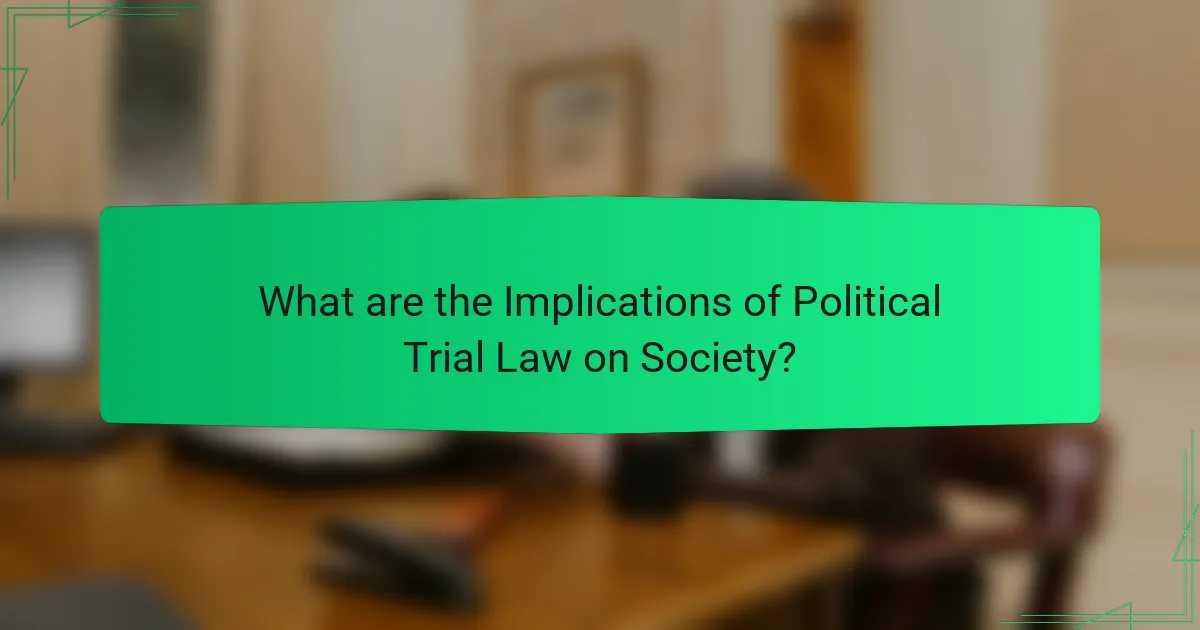
What are the Implications of Political Trial Law on Society?
Political trial law significantly impacts society by shaping the legal framework surrounding political dissent. It influences how governments respond to opposition and activism. Such laws can deter free speech by imposing legal risks on individuals expressing dissenting opinions. This chilling effect can lead to self-censorship among citizens. Historical examples include the use of political trials to suppress civil rights movements. For instance, during the McCarthy era, many faced trials for alleged communist affiliations. These events illustrate how political trial law can erode public trust in legal systems. Additionally, they can polarize society by creating an environment of fear and mistrust. Ultimately, the implications extend to the broader discourse on human rights and democratic freedoms.
How does Political Trial Law affect public discourse?
Political Trial Law significantly influences public discourse by shaping the legal framework within which political expression occurs. It establishes guidelines for permissible speech related to political figures and issues. This law can deter individuals from participating in political discussions due to fear of legal repercussions. For instance, cases involving defamation claims against critics can chill free speech. Furthermore, political trials often receive extensive media coverage, impacting public perception and debate. The outcomes of these trials can set precedents that affect future discourse. Overall, Political Trial Law serves as both a protector and a potential suppressor of free expression in political contexts.
What are the societal consequences of restricting Freedom of Speech?
Restricting freedom of speech leads to significant societal consequences. It stifles public discourse and limits the exchange of ideas. This can result in a less informed citizenry. When people cannot express dissenting opinions, it fosters an environment of fear and conformity. Historical examples show that such restrictions often lead to authoritarianism. For instance, regimes that suppress speech typically face increased civil unrest. Studies indicate that societies with limited speech rights experience higher levels of social division. Overall, restricting freedom of speech undermines democracy and erodes trust in institutions.
How can Political Trial Law promote or hinder civic engagement?
Political Trial Law can both promote and hinder civic engagement. It promotes civic engagement by ensuring accountability and transparency in government actions. For example, landmark cases like New York Times Co. v. Sullivan established protections for free speech, encouraging public discourse. These protections empower citizens to challenge government decisions and advocate for change.
Conversely, Political Trial Law can hinder civic engagement through restrictive measures. Laws that limit protest rights or impose heavy penalties can discourage participation. Additionally, politically motivated prosecutions can intimidate activists, stifling dissent. Historical instances, such as the use of sedition laws during the Red Scare, illustrate how legal frameworks can suppress civic involvement.
What are the best practices for navigating these legal boundaries?
Understand the legal framework governing political trial law and freedom of speech. Familiarize yourself with relevant case law and statutes. Consult legal experts for specific guidance. Keep updated on changes in legislation and court rulings. Document all communications related to political speech. Be mindful of the context and audience when expressing opinions. Engage in dialogue to clarify misunderstandings. Use clear, factual language to minimize misinterpretation.
How can individuals protect their Freedom of Speech in political contexts?
Individuals can protect their Freedom of Speech in political contexts by understanding their rights and engaging in advocacy. Familiarizing oneself with the First Amendment is crucial, as it guarantees free speech in the United States. Participating in peaceful protests is a practical way to express political opinions. Documenting instances of censorship can also help raise awareness and support. Joining organizations that defend civil liberties provides resources and legal assistance. Engaging in public discourse through writing or speaking promotes free expression. Utilizing social media responsibly allows for broader dissemination of ideas. Lastly, voting for representatives who prioritize free speech ensures political support for these rights.
What resources are available for understanding Political Trial Law?
Resources for understanding Political Trial Law include legal textbooks, academic journals, and online databases. Textbooks provide foundational knowledge and case studies. Academic journals publish peer-reviewed articles that analyze recent developments. Online databases, like Westlaw and LexisNexis, offer access to legal documents and case law. Additionally, government websites provide official information on laws and regulations. Legal seminars and workshops also serve as valuable educational platforms. These resources collectively enhance comprehension of political trial law and its implications.
The main entity of the article is the intersection of Political Trial Law and Freedom of Speech. This article examines the legal boundaries that govern political expression, highlighting key principles of Political Trial Law, landmark cases, and their implications for society. It discusses how these laws influence public discourse, the potential conflicts that arise, and the societal consequences of restricting free speech. Additionally, the article provides insights into best practices for navigating legal boundaries and resources available for understanding Political Trial Law.
